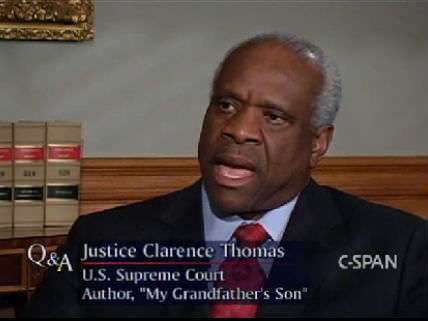Clarence Thomas Tells SCOTUS to Stop Deferring to Federal Agencies
The conservative justice takes aim at judicial deference.

The U.S. Supreme Court receives hundreds of petitions each term from parties seeking to have their cases heard. Most of those petitions are rejected by the Court without any comment or explanation. But on certain rare occasions, one or more justices will speak out in dissent when the Court refuses to take a case. This week Justice Clarence Thomas did precisely that, lambasting his colleagues for choosing "to sit idly by" while bureaucrats at the Department of Education were allowed to set the scope of their own regulatory powers free from any meaningful judicial review by the federal courts.
Thomas' dissent came in a case called United Student Aid Funds, Inc. v. Bible. At issue was a 2015 ruling by the U.S. Court of Appeals for the 7th Circuit which granted broad deference to the Department of Education and its interpretation of federal law and accompanying federal agency rules covering the repayment of student loans. "Even if this were not the best interpretation of the statutes and accompanying regulations," the 7th Circuit declared, "it is at least a reasonable one, and we defer to that interpretation because it reflects the reasoned position of the Secretary of Education, who is tasked with administering the program."
As authority for this deferential stance, the 7th Circuit cited the Supreme Court's 1997 decision in the case of Auer v. Robbins. In Auer Justice Antonin Scalia led the Court in granting extremely broad deference to a federal agency's interpretation of its own rules. Scalia's Auer opinion relied in turn on the Supreme Court's 1945 precedent in a case known as Bowles v. Seminole Rock & Sand Co. "Since this involves an interpretation of an administrative regulation a court must necessarily look to the administrative construction of the regulation if the meaning of the words used is in doubt," the Court held in Seminole Rock. "The ultimate criterion is the administrative interpretation, which becomes controlling weight unless it is plainly erroneous or inconsistent with the regulation."
This week's rejected case, United Student Aid Funds, Inc. v. Bible, asked the Supreme Court to overturn the 7th Circuit and to overrule Auer and Seminole Rock once and for all.
There is certainly good reason for the Supreme Court to revisit those two misguided precedents. As Columbia University law professor Philip Hamburger and the Washington Legal Foundation argue in an amicus brief they submitted in Bible, "the office enjoyed by judges under Article III of the Constitution is one of independent judgment, not deference, heightened respect, or other predisposed bias towards the most powerful of parties—the federal government. Such deference represents a dramatic departure from judicial independence, due process, and the rule of law."
I think that's exactly right. I would also add that the whole idea behind judicial deference is that unelected judges should be reluctant to overturn legislation passed by democratically accountable lawmakers on the grounds that such legislation (in theory) reflects the will of the majority. Yet under Seminole Rock/Auer deference, judges are not deferring to any sort of democratically accountable lawmakers; instead, they are deferring to federal bureaucrats. The traditional case for judicial deference is therefore particularly weak in this area of the law.
The Supreme Court, however, refused to get involved this week and declined to revisit Auer and Seminole Rock at this time. Those precedents remain what lawyers call "good law." That's what inspired Clarence Thomas to speak out in dissent. "This case is emblematic of the failings of Seminole Rock deference," Thomas wrote. "By enabling an agency to enact 'vague rules' and then to invoke Seminole Rock to 'do what it pleases' it later litigation, the agency (with the judicial branch as its co-conspirator) 'frustrates the notice and predictability purposes of rulemaking, and promotes arbitrary government.'"


Show Comments (48)